Solar Energy Market Research, 2032
The global solar energy market size was valued at $94.6 billion in 2022, and solar energy industry is projected to reach $300.3 billion by 2032, growing at a CAGR of 12.3% from 2023 to 2032.
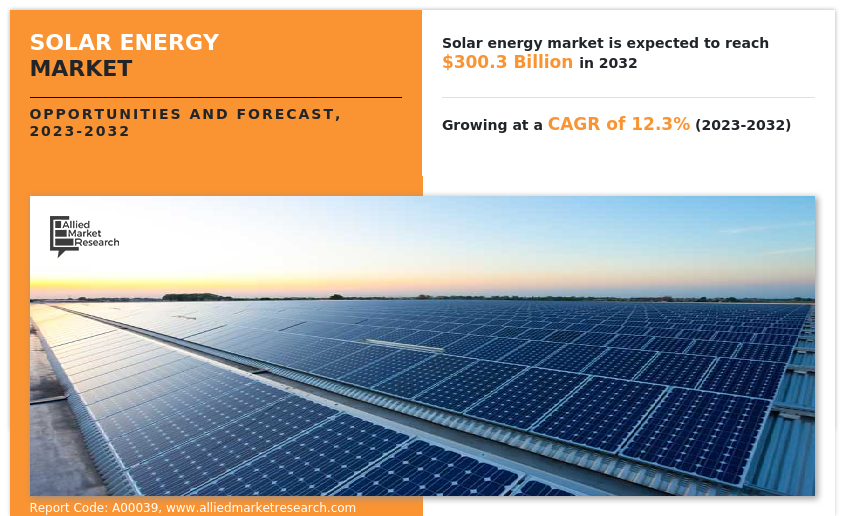
Solar energy refers to the energy that is obtained from the radiation of the sun, which may be harnessed and converted into various forms of energy, such as electricity and heat. This energy is abundant and renewable, making it an attractive alternative to traditional fossil fuels that are finite and contribute to climate change. Solar energy may be harnessed using different technologies, such as photovoltaic cells, which convert sunlight directly into electricity, or concentrated solar power systems, which use heat of the sun to generate electricity or provide hot water for various applications. The use of solar energy has many benefits, including reducing greenhouse gas emissions, reducing dependence on fossil fuels, and contributing to a cleaner and more sustainable energy future.
The growth of the global solar energy market is majorly driven by an increase in energy demand due to a surge in population. In addition, surge in need for sustainable energy resources has been witnessed across the globe, coupled with favorable government regulations that have boosted market growth. These regulations focus on reduced dependency on fossil fuels and help in controlling environmental pollution. This in turn favors the demand for renewable energy sources such as solar energy. In addition, the reduction of carbon footprint and an upsurge in the need for low-cost energy generation are expected to propel the solar energy market growth.
However, factors such as the high cost of installation, storage, and power conversion devices and the low efficiency of the solar module are expected to hinder the growth of this market. On the contrary, a decrease in the cost of solar systems and energy storage devices is expected to offer a lucrative opportunity for market growth. In addition, an increase in prices of fossil fuels is anticipated to provide remunerative opportunities for market expansion, as the rise in prices of fossil fuels, such as coal, is anticipated to boost the cost of electricity generation, which in turn is projected to result in an increase in the usage of alternative energy source such as solar energy.
“Solar Energy in Developing Countries”
Solar energy is increasingly being seen as an attractive solution for developing countries, where access to electricity is limited, and traditional sources of energy are often expensive or unreliable. Many developing countries now invest in solar power to meet their energy needs with the cost of solar energy technologies decreasing and the availability of government subsidies.
One of the main benefits of solar energy is that it is a renewable and sustainable source of energy. Solar energy may be harnessed indefinitely without causing harm to the environment unlike traditional fossil fuels, which are finite resources and contribute to climate change. This is especially important for developing countries, where the impact of climate change is often more severe than in developed countries.
Moreover, solar energy may be a cost-effective solution for providing electricity to rural communities, where grid connections are often non-existent or expensive to install. These communities may generate their electricity, reducing their reliance on expensive and often unreliable diesel generators by harnessing the power of the sun. This, in turn, may improve their economic prospects and quality of life.
However, despite the numerous benefits of solar energy, there are still challenges to its implementation in developing countries. One of the main challenges is the lack of technical expertise and trained personnel to maintain and operate solar energy systems. This is particularly true for rural communities where there may be limited access to technical training and support. However, some companies and organizations work to address this issue by providing training and support to local communities, allowing them to take ownership of their energy systems and become self-sufficient.
The solar energy market forecast is segmented on the basis of technology, solar module, application, end-use, and region. On the basis of technology, the global solar energy market is bifurcated into photovoltaic system and concentrated solar power system. On the basis of solar module, the market is classified into monocrystalline, polycrystalline, cadmium telluride, amorphous silicon cells, and others. On the basis of application, the market is divided into residential, commercial, and industrial. On the basis of end-use, the market is segregated into electricity generation, lighting, heating, and charging. On the basis of region, the market is studied across North America, Europe, Asia-Pacific, and LAMEA and suggests future growth opportunities.
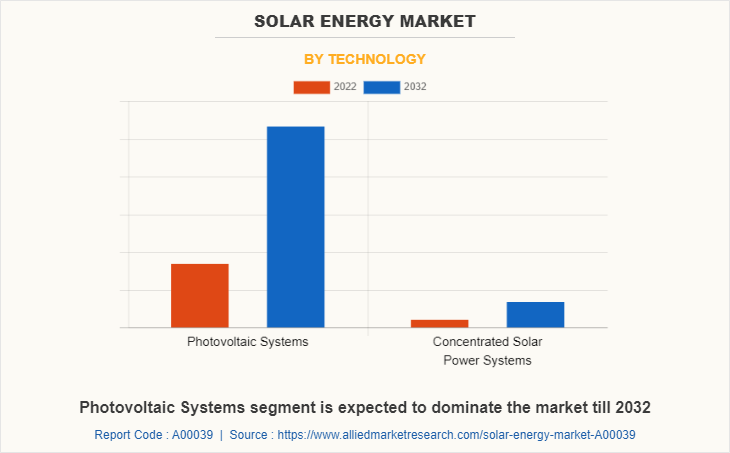
On the basis of technology, the photovoltaic systems segment emerged as the global leader by acquiring more than four-fifths of the solar energy market share in 2022 and is anticipated to continue this trend during the forecast period. The surge in the growth of the electric vehicle market is driving demand for solar-powered EV charging infrastructure which has a positive impact on the solar energy market. In addition, the global market for PV systems has experienced significant growth in recent years, driven by declining costs and government incentives. Furthermore, governments around the world increasingly prioritize renewable energy sources, and the demand for solar power is expected to rise, creating opportunities for innovation and growth in industry.
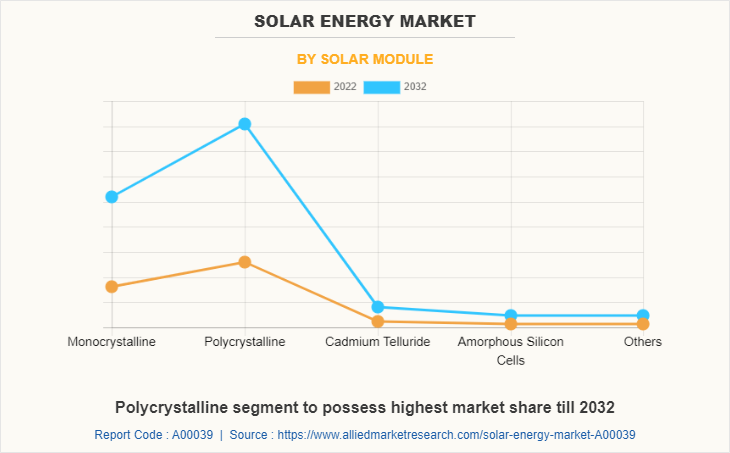
On the basis of solar module, the polycrystalline segment emerged as the global leader by acquiring more than half of the solar energy market shares in 2022 and is anticipated to continue this trend during the forecast period. Multi-Si technology is widely used in the electronic industry to manufacture calculators and smartwatches. Increase in the disposable income of consumers and a rise in the standard of living have boosted the demand for electronics and smart devices, which in turn is expected to increase the need for multi-Si solar cell technology.
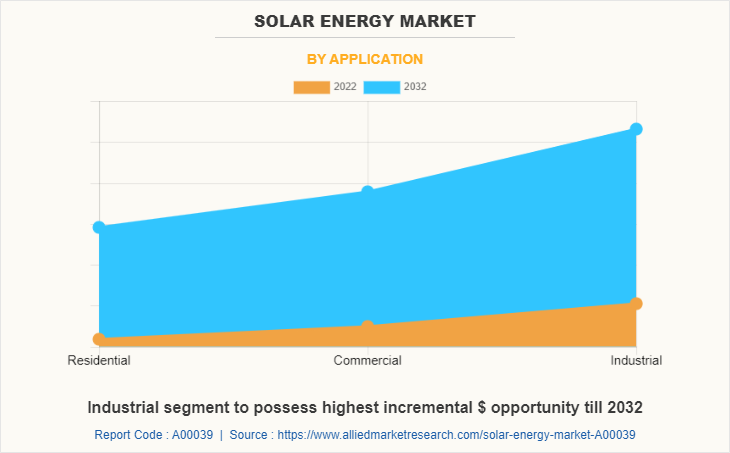
On the basis of application, the industrial segment emerged as the largest market share in 2022 which accounts more than two-fifths of the solar energy market share and is anticipated to continue this trend during the forecast period. Rapid industrialization across the globe and increase in population have led to an increase in the demand for various commercial products. The increase in production has led to the demand for power which led to a surge in the utilization of solar concentrators in the power generation sector. Furthermore, solar concentrator energy is also used in desalination plants in countries that have low water resources, especially in countries in the Middle East region.
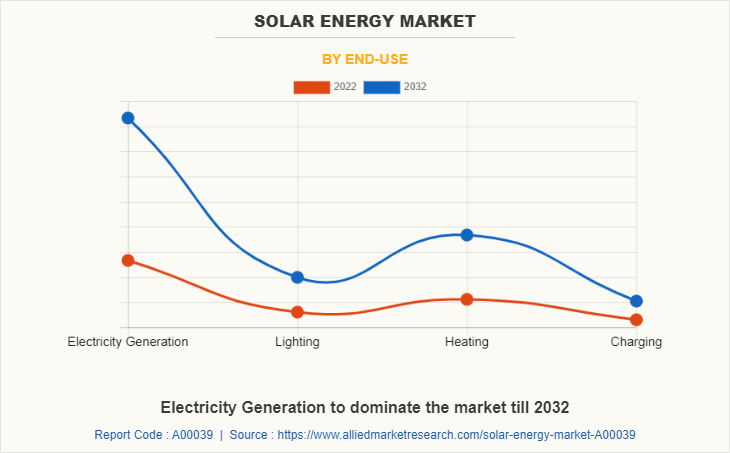
On the basis of end-use, the electricity generation segment emerged as the largest market share in 2022 which accounts more than half of the solar energy market share and is anticipated to continue this trend during the forecast period. The presence of increased awareness regarding the greenhouse gas impact on the environment has led to the search for alternative power generation solutions which led to solar concentrators. The primary resource such as sunlight is utilized which is an inexhaustible renewable resource. Furthermore, the low presence of fossil fuel resources in developing countries such as India and China has led to the development of solar-based power plants to generate power.
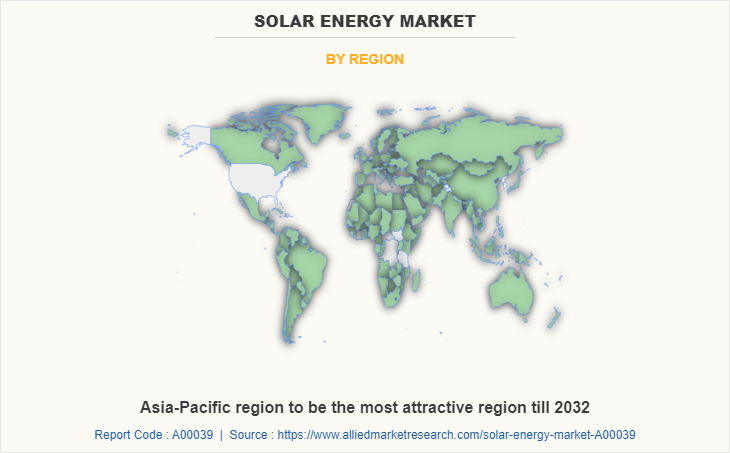
On the basis of region, Asia-Pacific is the major consumer of solar energy among other regions. It accounted for more than two-fifths of the global market shares in 2022. According to the BP Statistical Review of World Energy 2022, solar energy generation in Asia-Pacific in 2020 was 466.7 TWh and grew to 581.5 TWh in 2021. The solar energy share in total electricity production of Asia-Pacific for 2021 is 34.4%. Increase in the production of solar energy in Asia-Pacific is attributed to a surge in the usage of solar energy in standalone systems such as solar streetlamps and telecommunication & signaling towers.
Impact of Russia – Ukraine War on Global Solar Energy Market
The ongoing conflict between Russia and Ukraine may potentially have an impact on the solar energy market, but the specific effects are difficult to predict with certainty.
One possible impact may be on the supply chain for solar panels and other components. Both Russia and Ukraine are significant producers of solar panel materials such as silicon, and disruptions to production or transportation could lead to higher prices or shortages. In addition, political instability in the region could lead to changes in energy policies or tariffs that affect the viability of solar energy projects. If the conflict leads to an increase in energy prices or a decrease in government incentives for renewable energy, it may become more difficult to finance and operate solar projects in the affected areas.
However, it is also possible that the conflict could drive investment in renewable energy to decrease dependence on fossil fuels and energy imports. This could lead to increased demand for solar panels and related equipment, as well as new opportunities for solar energy developers.
Competitive Landscape
First Solar, Inc., SunPower Corporation, Canadian Solar Inc., JinkoSolar Holding Co., Ltd., Trina Solar Co., Ltd, Yingli Green Energy Holding Company Limited, Hanwha Q Cells, JA Solar Holdings Co., Ltd., SolarEdge Technologies, and Enphase Energy Inc., are some of the major players discussed in the report. The rapid development of industrialization, modernization, and the spread of information through the internet led to the development of the tourism industry which in turn has fueled the demand for solar energy. Additional growth strategies such as an expansion of production capacities, acquisition, partnership, and research & innovation in the solar energy application led to attaining key developments in the global solar energy market trends
Key Benefits For Stakeholders
- This report provides a quantitative analysis of the market segments, current trends, estimations, and dynamics of the solar energy market analysis from 2022 to 2032 to identify the prevailing solar energy market opportunities.
- The market research is offered along with information related to key drivers, restraints, and opportunities.
- Porter's five forces analysis highlights the potency of buyers and suppliers to enable stakeholders make profit-oriented business decisions and strengthen their supplier-buyer network.
- In-depth analysis of the solar energy market segmentation assists to determine the prevailing market opportunities.
- Major countries in each region are mapped according to their revenue contribution to the global market.
- Market player positioning facilitates benchmarking and provides a clear understanding of the present position of the market players.
- The report includes the analysis of the regional as well as global solar energy market trends, key players, market segments, application areas, and market growth strategies.
Solar Energy Market Report Highlights
| Aspects | Details |
| Market Size By 2032 | USD 300.3 billion |
| Growth Rate | CAGR of 12.3% |
| Forecast period | 2022 - 2032 |
| Report Pages | 526 |
| By Technology |
|
| By Solar Module |
|
| By Application |
|
| By End-Use |
|
| By Region |
|
| Key Market Players | SolarEdge Technologies, SunPower Corporation, First Solar, Inc., Canadian Solar, JinkoSolar Holding Co., Ltd., Trina solar, Yingli Green Energy Holding Company Limited, Hanwha Q Cells Co., Ltd., Enphase Energy, Inc., JA Solar Holdings Co. Ltd. |
Analyst Review
As per CXO Perspective, the global solar energy market is expected to witness increased demand during the forecast period, due to rise in awareness among the people regarding the advantages of green energy and high-efficiency conversion of solar panels.
In solar energy, a solar cell is preferred over other sources of electricity generation, as it requires minimum maintenance and is pollution free. The solar energy market is expected to grow at a rapid pace during the forecast period, owing to an increase in demand for electricity and a rise in initiatives by the government to reduce CO2 emissions. In addition, solar technology has gained popularity in recent years, owing to an increase in awareness of renewable sources of energy.
The Asia-Pacific solar energy market offers lucrative opportunities for key manufacturers, owing to the rapid installation of solar technology to increase renewable energy generation. In addition, China actively enhances its solar power to cope with its pollution demands and to boost its domestic manufacturing industry.
The increase in the demand for electricity from commercial & industrial sectors, especially during peak hours, is a major market driver. Key market players have come up with the latest advanced solar modules focusing on efficiency, cost, and design of the solar panel as demand for solar-based electricity is increasing across the world. The major factor hindering the growth of the market is its huge installation cost.
Government incentives, regulations and growth in demand for renewable energy sources are the key factors boosting the Solar energy market growth.
Growth in concerns over climate change and environmental issues is the Main Driver of Solar energy Market.
The market value of Solar energy in 2032 is expected to be $300.3 billion
Industrial application is projected to increase the demand for Solar energy Market
The solar energy market is segmented on the basis of technology, solar module, application, end-use, and region. On the basis of technology, the global solar energy market is bifurcated into photovoltaic system and concentrated solar power system. On the basis of solar module, the market is classified into monocrystalline, polycrystalline, cadmium telluride, amorphous silicon cells, and others. On the basis of application, the market is divided into residential, commercial, and industrial. On the basis of end-use, the market is segregated into electricity generation, lighting, heating, and charging. On the basis of region, the market is studied across North America, Europe, Asia-Pacific, and LAMEA.
First Solar, Inc., SunPower Corporation, Canadian Solar Inc., JinkoSolar Holding Co., Ltd., Trina Solar Co., Ltd, Yingli Green Energy Holding Company Limited, Hanwha Q Cells, JA Solar Holdings Co., Ltd., SolarEdge Technologies, and Enphase Energy Inc.
Loading Table Of Content...
Loading Research Methodology...


